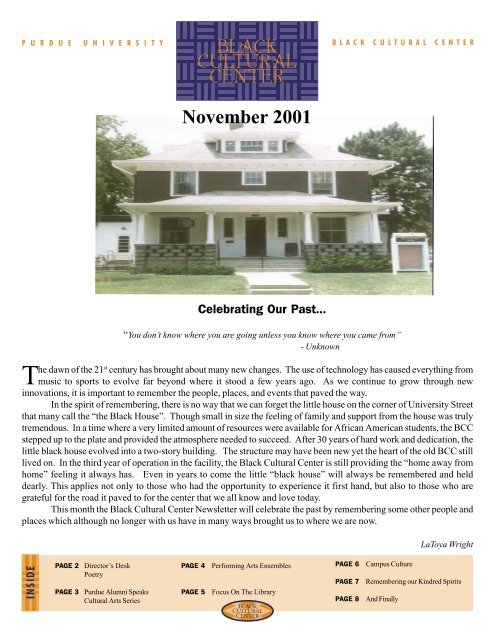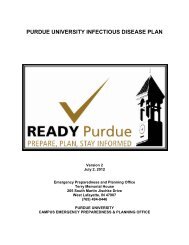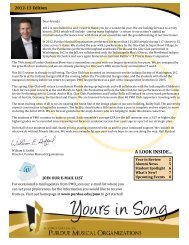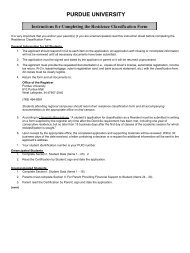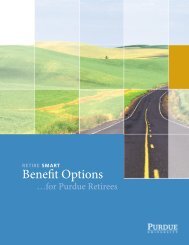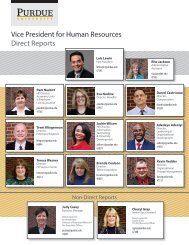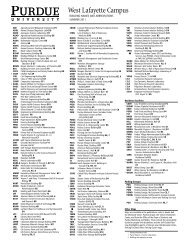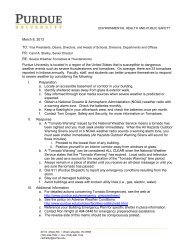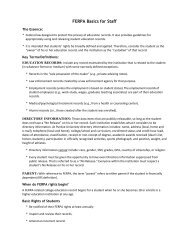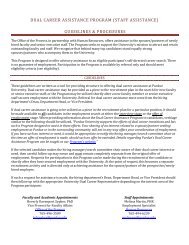You also want an ePaper? Increase the reach of your titles
YUMPU automatically turns print PDFs into web optimized ePapers that Google loves.
Celebrating Our Past…<br />
“You don’t know where you are going unless you know where you came from”<br />
- Unknown<br />
The dawn of the 21st century has brought about many new changes. The use of technology has caused everything from<br />
music to sports to evolve far beyond where it stood a few years ago. As we continue to grow through new<br />
innovations, it is important to remember the people, places, and events that paved the way.<br />
In the spirit of remembering, there is no way that we can forget the little house on the corner of <strong>University</strong> Street<br />
that many call the “the Black House”. Though small in size the feeling of family and support from the house was truly<br />
tremendous. In a time where a very limited amount of resources were available for African American students, the BCC<br />
stepped up to the plate and provided the atmosphere needed to succeed. After 30 years of hard work and dedication, the<br />
little black house evolved into a two-story building. The structure may have been new yet the heart of the old BCC still<br />
lived on. In the third year of operation in the facility, the Black Cultural Center is still providing the “home away from<br />
home” feeling it always has. Even in years to come the little “black house” will always be remembered and held<br />
dearly. This applies not only to those who had the opportunity to experience it first hand, but also to those who are<br />
grateful for the road it paved to for the center that we all know and love today.<br />
This month the Black Cultural Center Newsletter will celebrate the past by remembering some other people and<br />
places which although no longer with us have in many ways brought us to where we are now.<br />
PAGE 2 Director’s Desk<br />
Poetry<br />
PAGE 3 <strong>Purdue</strong> Alumni Speaks<br />
Cultural Arts Series<br />
<strong>November</strong> 2001<br />
PAGE 4 Performing Arts Ensembles<br />
PAGE 5 Focus On The Library<br />
PAGE 6 Campus Culture<br />
LaToya Wright<br />
PAGE 7 Remembering our Kindred Spirits<br />
PAGE 8 And Finally
2<br />
www.purdue.edu/<br />
BCC<br />
Remembering Our Heritage<br />
As I write these remarks I am tremendously proud. I am proud that I share the<br />
rich history and heritage of a people who in spite of the odds, have risen to the<br />
task and are still moving forward. I am proud that even though people have sought to<br />
rewrite history, and even redefine a people, the truth has prevailed.<br />
It has been said, “He who does not know history is doomed to repeat it”. We<br />
as African Americans must put forth a concerted effort to know and write our own<br />
history. When we allow others to define who we are and describe our experience, we<br />
invite distortion and half-truth. For people who have been systematically excluded<br />
from the mainstream of society, it is especially important to remember and celebrate<br />
those who have made significant contributions. As a result of knowing our history,<br />
we can reclaim and create a heightened awareness about individuals, contributions<br />
and struggles that have made African American survival and<br />
progress possible.<br />
For too long our people have been left in the dark about who we are and our<br />
rich and noble history. It is our responsibility to stay informed. The BCC will assist<br />
you in learning more about the contributions of African Americans by attending some<br />
of our upcoming lectures. I also invite you to take advantages of the outstanding<br />
resources available in the BCC library to assist with your quest for knowledge. This<br />
months’ newsletter theme is “Celebrating Our Past” this edition pays tribute to some<br />
young and not so young individuals who have recently passed and become part of our<br />
collective history.<br />
African Americans are great people and we must keep holding our heads high<br />
because in our veins flows the courage of Harriet Tubman, the perseverance of Mary<br />
McCloud Bethune, the inspiration of Booker T. Washington, the vision of W.E.B.<br />
DuBois, the military genius of Hannibal and the unconquerable beauty of Cleopatra<br />
and Queen Nefertiti. In our veins is the creativity of Paul Robeson, the bravery of<br />
Malcolm X, the hope of Whitney Young. In our veins is the compassion of Martin<br />
Luther King Jr., the intellectual astuteness of Dr. George Washington Carver, the<br />
business genus of Madame C.J. Walker, the political savvy of Jesse Jackson and the<br />
convictions of Nelson Mandela. With a blood this rich running in your veins, you are<br />
destined for success. I look forward to you creating a legacy by achieving your<br />
personal goals and aspirations so you too will become part of our African American<br />
heritage.<br />
Renee Thomas<br />
2001-2002 Black<br />
Cultural Center<br />
Newsletter Staff<br />
From Left: Earnest<br />
Wallace, LaToya<br />
Wright, Kendra<br />
Bracken, Kristen<br />
Bright, Eugene<br />
Johnson<br />
“Cultural Education and<br />
Resilience: African<br />
American Challenges and<br />
Triumphs in the New World<br />
Order.”<br />
For the past eight hundred years,<br />
Western scholars have seldom<br />
framed African/African American cultural<br />
traditions in a positive light, and have for<br />
the most part denigrated them. Now the<br />
heights of knowledge across cultural<br />
groups from Western science to Eastern<br />
philosophies are supporting many of the<br />
assumptions of an African cultural<br />
tradition of wisdom and deep thought that<br />
can be traced from humanity’s earliest<br />
historical records to contemporary times<br />
among African Americans. Dr. Linda<br />
James Myers’ presentation will focus on<br />
the need for and value of the kind of<br />
cultural education that would help us<br />
understand African American resilience<br />
in the face of many generations of<br />
terrorism. How have the descendents of<br />
enslaved Africans endured the worst kind<br />
of surprise attacks, kidnap, murder of<br />
millions, torture and brutal attempts at<br />
dehumanization over three hundred<br />
years, creating economic foundation for<br />
this country’s wealth?<br />
In light of the events of<br />
September 11, 2001, we could benefit<br />
greatly from noting that the African<br />
American reaction to terrorism en masse<br />
has centered around serving as the moral<br />
conscience of the United States of<br />
America, a beacon for civil rights and<br />
justice for all. This issue and several<br />
questions will be addressed. What<br />
psychobiosocial understandings can<br />
account for our historic cultural<br />
orientation to peace? Why has the<br />
acknowledgement and appreciation of<br />
such cultural traditions in African centered<br />
scholarship over the past two decades<br />
been perceived by many as such a threat<br />
to the Western academy, and become the<br />
target of the most uncivil and unscholarly<br />
attacks? Given the most current<br />
Continued on page 3
We must go back and reclaim our past so we can move<br />
forward; so we can understand why and how we came to<br />
be who we are today. –Sankofa<br />
It has taken me some time to gather my thoughts for writing this brief article. Thinking<br />
long and hard on the subject of kindred spirits I had to ask myself first what that<br />
meant and then determine what it means to the black community, particularly supporters<br />
of the BCC. The answer I came up with was ‘experience’.<br />
The Black experience in America is full of commonalities that make us kindred<br />
spirits. Though there exists no single ‘Black Experience’, we share an inherent<br />
understanding of one another through our relationship to this society and the world.<br />
We understand that in spite of certain ills and concerns that continuously plague the<br />
community there is a defining concept that ties us all together; our Blackness. That<br />
Blackness is not determined by socio-economic conditions, financial well-being, or<br />
educational attainment, but it is through the presence of melanin in our skin that we<br />
are provided a unique experience known only to us. Strong memories flow through<br />
us of hardships never seen only heard and felt bringing tears to our eyes, countered<br />
by joys of emancipatory celebrations bringing once again tears to our eyes. The call<br />
of Africa’s drum lives in our soul and the savor for her cuisine is indelibly grafted to<br />
our palate. An intrinsic creativity flows through our thought patterns that brings forth<br />
rhythmic speech and flows, moves and skills, cultures and climates developed For Us<br />
By Us. This is the experience of being Black in America. The experience has<br />
strengthened and sustained the African, the Colored, the Negro, the Black, the Afro<br />
and African American and provided a resiliency of spirit.<br />
I believe that it’s important for us to realize the connection we each have to<br />
the community and of the community to our history. The hopes and dreams of our<br />
ancestry gave us the fuel to progress while mandating responsibility.<br />
Sing a song full of the faith that the dark past has taught us, Sing a song full of the<br />
hope that the present has brought us…<br />
Harambee!<br />
Joseph E. Jones, Sr. (Former BCC Operations Supervisor and <strong>Purdue</strong> Graduate)<br />
Assistant Dean of Students, Minority Services and Programs<br />
Director, African American Cultural Center<br />
Continued from page 2<br />
<strong>Purdue</strong> Alumni Remembers Our<br />
Kindred Spirit<br />
biogenetic, archaeological and anthropological evidence, why has the need to explore<br />
such cultural traditions as foundational to our humanity been almost totally overlooked?<br />
In what ways has the miseducation Carter G. Woodson cautioned against over seventy<br />
years ago handicapped our ability to realize our rich cultural heritage and priceless<br />
cultural inheritance? Plan to hear Dr. Linda James Myers explore these issues on<br />
Thursday, <strong>November</strong> 8 at 7:00pm in Stewart Center room 206.<br />
Thursday, <strong>November</strong> 8, 2001<br />
African American Challenges and<br />
Triumphs in the New World Order<br />
~Dr. Linda James Myers<br />
7p.m.<br />
206 Stewart Center<br />
Dr. Meyers is considered a pioneer for her<br />
work in the development of Optimal<br />
Psychology – an Afrocentric approach<br />
toward fostering human development. Dr.<br />
Myers explores issues of culture, racism,<br />
sexism, & the developmental psychology of<br />
African-Americans. She is frequently sought<br />
for her expert analysis by Essence, Ebony and<br />
Elle.<br />
Saturday, <strong>November</strong> 10, 2001<br />
Floyd Cooper, Illustrator<br />
2 p.m. BCC Multipurpose Room<br />
Floyd Cooper is an award-winning artist<br />
who has illustrated over twenty-five<br />
children’s books including Danitra<br />
Brown, One April Morning, African<br />
Beginnings and Grandpa’s Face. Although<br />
most of his illustrations are that of<br />
African Americans, Cooper has also<br />
illustrated books that include the<br />
Japanese culture. Co-Sponsored with<br />
Teachers Encouraging a Love for<br />
Literature (TELL).<br />
Wednesday, <strong>November</strong> 14, 2001<br />
Dr. Freeman Hrabowski, III<br />
7 p.m. <strong>Purdue</strong> Memorial Union, West<br />
Faculty Lounge<br />
Dr. Hrabowski, III has served as President<br />
of the <strong>University</strong> of Maryland Baltimore<br />
County since 1992. He is the co-author<br />
of Beating the Odds, focusing on<br />
parenting and high-achieving African<br />
American males in science. Dr.<br />
Hrabowski is currently co-authoring a<br />
second book, Overcoming the Odds, on<br />
successful African American females in<br />
science. Co-Sponsored with the<br />
Historically Black Institution Visitation<br />
Program.<br />
Saturday, December 1, 2001<br />
Loeb Playhouse<br />
7 p.m. Fowler Hall<br />
Featuring BCC Performing Arts<br />
Ensembles<br />
Admission: $5/<strong>Purdue</strong> Students, $7/<br />
general public<br />
3
Congratulations to the New Directional Players on<br />
the successful completion of their first performance<br />
of the school year! “Soul in One: A Night of One Act<br />
Plays” was the theme of the coffeehouse held last month and it included two plays:<br />
“Hard to Serve” by Angela Wideman and “Moon Women Eat Pecan Pie” by Addae<br />
Moon.<br />
Set in a classroom for at-risk kids, “Hard to Serve” dealt with a wide<br />
range of issues including alcoholism, rape and theft. Each character shared<br />
their experiences in coping with the issues they were faced with, but each also<br />
concluded by sharing a dream or longing despite all they had been through.<br />
Overall, the play dramatized the need for people to hold onto their dreams, no<br />
matter how difficult their circumstances may seem at times.<br />
“Moon Women Eat Pecan Pie” took place in a diner at a bus station while a<br />
young college student, Rain, waits to board the bus to see her fiancee. Her best<br />
friend supports her decision to marry reminding her that her fiancée, which was her<br />
first and only boyfriend, is about to be a doctor, making their marriage a secure and<br />
safe decision. Later, Rain meets a young man, Grady, who shares with her the<br />
romantic story of a man who falls in love with a mysterious woman and spends his<br />
whole life waiting to be with her again. During their time at the bus station a small<br />
spark of romantic interest flickers between Rain and Grady though it is obvious that<br />
Rain is trying to ignore it because of its lack of practicality. Through the course of the<br />
play Rain is forced to rethink her decision—will she follow through on her plans<br />
because they are convenient and safe or will she follow her heart because it will make<br />
her happy?<br />
Thank you to NDP members Michael Adams, Carl Barnett, Crystal Durril, Michael<br />
Courtney, Kelly Chavers and Stacia Murphy. You guys did a great job!<br />
4<br />
www.purdue.edu/<br />
BCC<br />
Tribute to the Ensembles:<br />
Featuring New Directional Players and<br />
Jahari Dance Troupe<br />
A Menu of African-American Music<br />
On <strong>November</strong> 1 the Black Cultural Center’s Black Voices of<br />
Inspiration will perform in the Union North Ballroom at 7<br />
p.m. The theme, “A Menu of African-American Music” will feature a variety of<br />
genres including spiritual, gospel, Motown and R&B. Geoffrey Kelsaw, the new<br />
director for BVOI, has 20 years of experience in the music field. He directed the<br />
Taylor <strong>University</strong> choir for ten years, worked with several choral ensembles in the<br />
Fort Wayne Community Schools, was the Minister of Music at the Pilgrim Baptist<br />
Church in Fort Wayne and is currently Minister of Music at Mt. Zion Baptist Church<br />
in Indianapolis and the director of the gospel choir for the Christian Theological<br />
Seminary in Indianapolis. Come support Mr. Kelsaw and the rest of BVOI while<br />
enjoying a full “Menu of African-American Music.”<br />
Leading the<br />
Way:<br />
Mark Vaughn,<br />
Artist-in-<br />
Residence<br />
The Black Cultural<br />
Center would<br />
like to welcome Mark Vaughn, Jahari’s<br />
new artist-in-residence for the month of<br />
<strong>November</strong>. Vaughn, a native of<br />
Barbados, comes to us with 20 years of<br />
dance teaching experience. While in<br />
Barbados, Vaughn studied Afro-<br />
Caribbean, modern and jazz dance with<br />
the Barbados Dance Theatre Company.<br />
His love of dance translated into a life<br />
dedicated to learning and teaching the art.<br />
In 1985, following a sponsorship<br />
to attend a dance, music and history<br />
workshop in Senegal, West Africa,<br />
Vaughn was made the Assistant Artistic<br />
Director of the Country Theater<br />
Workshop Dance Company in Barbados.<br />
A few years later Vaughn taught in Miami,<br />
Florida for the “Inner City Children’s<br />
Touring Dance Company,” and following<br />
that, Vaughn had to opportunity to<br />
perform and study with the Najwa Dance<br />
Corps in Chicago, Illinois. Throughout<br />
the years, Vaughn has had the<br />
opportunity to teach at many institutions<br />
including Northern Illinois <strong>University</strong>, the<br />
<strong>University</strong> of the Arts in Philadelphia,<br />
Morgan State <strong>University</strong> and Columbia<br />
College in Chicago. Vaughn’s other<br />
honors include appearing on Oprah<br />
Winfrey’s television series, “The Women<br />
of Brewster Place,” and touring with the<br />
internationally acclaimed musical from<br />
London, “Black Heroes in the Hall of<br />
Fame,” throughout the United States.<br />
Vaughn’s leadership led him to<br />
be a founding member for the Kopano<br />
Performing Arts Company, where he<br />
served as the Artistic Director for five<br />
years. With his personal philosophy being<br />
“to whom much is given much is<br />
required,” Vaughn dedicates himself to<br />
“passing on as much as he can to those<br />
who are willing to accept.”<br />
Kristen Bright
Gwendolyn<br />
Brooks<br />
(1917-2000)<br />
At the age of 83, renowned poet<br />
Gwendolyn Brooks passed away<br />
following a short-term illness. Many<br />
knew Brooks for her poetry, which<br />
promoted an understanding of black<br />
culture.<br />
Gwendolyn Brooks was born in<br />
Topeka, Kansas in 1917. Soon after, she<br />
and her family moved to Chicago, Illinois<br />
where she spent the vast majority of her<br />
life. Early in her childhood, Brooks<br />
became aware of her interest in writing<br />
and by the age of thirteen, she won the<br />
attention of the American Child<br />
magazine, which published her first<br />
poem. Brooks continued her writing<br />
career throughout high school and college.<br />
Through her poetry Brooks<br />
provided insight into the black<br />
community, she achieved this by using<br />
her own personal experiences of herself<br />
and her loved ones to as inspiration. After<br />
years of writing and collecting her first<br />
published book of poems was released<br />
entitled, “A Street in Bronzeville,” in<br />
1945.<br />
Beating the Odds<br />
By: Freeman A.<br />
Hrabowski III,<br />
Kenneth I. Maton &<br />
Geoffrey L. Greif<br />
To say that Gwendolyn Brooks<br />
has achieved many things in her lifetime<br />
would be an understatement. In 1950,<br />
she won the Pulitzer Prize in literature<br />
for her second book of poetry “Annie<br />
Allen.” Brooks other achievements<br />
include: the Lifetime Achievement Award<br />
for the Arts, the National Endowment<br />
for the Arts awarded her Jefferson<br />
Lecturer for the Humanities, which is the<br />
highest honor bestowed by the federal<br />
government. In addition, Gwendolyn<br />
Brooks encouraged many young writers<br />
through her position as Illinois Poet<br />
Laureate and also by professor at the<br />
<strong>University</strong> of Chicago. She held this<br />
position until her death in the year of<br />
2000 at the age of 83.<br />
Years ago <strong>Purdue</strong> <strong>University</strong><br />
and the Black Cultural Center had the<br />
pleasure of experiencing this great literary<br />
figure first-hand. Mrs. Brooks drew a<br />
huge crowd of students, staff, and<br />
community when she came to speak at<br />
the university. Members of the Haraka<br />
writers will have the opportunity to gain<br />
some of that insight at the Gwendolyn<br />
Brooks writer’s conference that they will<br />
be attending in Chicago this month.<br />
Although Mrs. Brooks is no<br />
longer with us physically her spirit lives<br />
on through all those that she has inspired<br />
in her lifetime.<br />
LaToya Wright<br />
The Near-<br />
Johannesburg Boy and<br />
other poems<br />
By: Gwendolyn Brooks<br />
Grandpa’s<br />
Face<br />
Illustrated By:<br />
Floyd Cooper<br />
BCC READS<br />
L. Victoria Johnson<br />
to lead discussion on<br />
WOUNDS OF PASSION: A WRITING<br />
LIFE<br />
by: bell books<br />
Thursday & Friday, <strong>November</strong> 15<br />
&16, 2001, 6:30pm<br />
Black Cultural Center Library<br />
<strong>Purdue</strong> <strong>University</strong><br />
1100 3rd Street, West Lafayette, IN<br />
For more information contact:<br />
BCC Librarian Dorothy Washington,<br />
(765) 494-3093<br />
The BCC library is pleased to announce<br />
its forthcoming publication Africana<br />
Reviews: An Ocassional Online<br />
Publication edited by BCC Librarian<br />
Dorothy Washington.<br />
to disembark<br />
By: Gwendolyn<br />
Brooks<br />
5
Did you know?<br />
Omega Psi Phi Fraternity, Inc. is<br />
recognized as the first black student<br />
organization on <strong>Purdue</strong>’s campus. The<br />
organization came to <strong>Purdue</strong> in April<br />
1942, enriching the <strong>Purdue</strong> experience<br />
by exemplifying the motto: “Friendship<br />
is essential to the soul.” Currently the<br />
organization participates in Omega<br />
Christmas, Clean-up day on campus and<br />
the Charles R. Dru Blood drive. The<br />
Black Cultural Center and <strong>Purdue</strong> honors<br />
and salutes you.<br />
BCC Talk Series Explores<br />
African-American Issues<br />
In response to the plethora of issues<br />
concerning African-American life<br />
and culture, the Black Cultural Center<br />
will host the BCC Talk Series each<br />
month, slated to begin in <strong>November</strong>.<br />
A series of discussion places<br />
important emphasis on pertinent<br />
topics directly related to the African-<br />
American experience. In addition,<br />
topics will also cover issues<br />
pertaining to the African diaspora. In<br />
order to accommodate the voices that<br />
are frequently unheard, the BCC Talk<br />
series will allow students a forum to<br />
express their concerns and opinions<br />
regarding significant matters plaguing<br />
our extended community.<br />
6<br />
www.purdue.edu/<br />
BCC<br />
<strong>Purdue</strong><br />
Students<br />
Remember<br />
Aaliyah<br />
(1979-2001)<br />
Sometimes in our daily comings and<br />
goings we get lost in the trivial details<br />
of life and lose right of what is important<br />
to us. Many of us were affected by the<br />
tragic death of singer Aaliyah because she<br />
made us realized each moment is precious<br />
and that nothing is guaranteed.<br />
R&B vocalist Aaliyah (Swahili<br />
for “exalted one”) was born Aaliyah<br />
Haughton in New York in 1979 but grew<br />
up in Detroit. By the time she was 11,<br />
Aaliyah was backing Gladys Knight in Las<br />
Vegas. From there, she would emerge from<br />
a non-stop vocal training regimen with a<br />
sound and vision completely her own.<br />
Before finishing high school she released<br />
her solo debut, 1994’s Age Ain’t Nothing<br />
But a Number, which went platinum.<br />
In 2000, she contributed four tunes<br />
to the Romeo Must Die soundtrack. The<br />
following year, she came out with her latest<br />
album, simply titled Aaliyah. On August<br />
25, 2001, tragedy struck when Aaliyah was<br />
killed in a plane crash in the Bahamas. The<br />
R&B world mourned the death of the gifted<br />
singer, who was only twenty-two years old.<br />
<strong>Purdue</strong> Seniors Shy-Quon Ely and Angela<br />
Lott share their thoughts on this<br />
much-loved and talented artist:<br />
“I thought her death was really tragic<br />
because she was at the pinnacle of her<br />
career. So many doors were beginning to<br />
open up for her with her music and acting.<br />
Shy-Quon Ely<br />
Senior, School of Health Sciences<br />
“Her death makes you realize how<br />
important it is to live life to the fullest,<br />
appreciating each moment and not<br />
stressing about the small stuff. Faith in God<br />
works things out for the good.”<br />
Angela Lott<br />
Senior, School of Engineering<br />
Former <strong>Purdue</strong> Football<br />
Standout Continues Legacy<br />
Leroy Keyes was named an assistant<br />
director of the John <strong>Purdue</strong> Club<br />
in July 2000. Previously, Keyes served<br />
as administrative assistant for the<br />
football team (1997-99) and as running<br />
backs coach in 1995 and 1996.<br />
Keyes was voted <strong>Purdue</strong>’s All-<br />
Time Greatest Football Player in 1987<br />
in connection with the Boilermakers’<br />
football centennial anniversary. He was<br />
inducted into the College Football Hall<br />
of Fame in 1990 and was an inaugural<br />
inductee into the <strong>Purdue</strong> Intercollegiate<br />
Athletics Hall of Fame in 1994. Keyes<br />
was a halfback and defensive back from<br />
1966 to 1968. He was a two-time<br />
consensus All-American, the 1967 Big<br />
Ten Conference Most Valuable Player<br />
and runner-up in the 1968 Heisman<br />
Trophy balloting. Keyes 2,090 career<br />
rushing yards rank seventh in school<br />
history.<br />
A native of Newport News,<br />
Va., Keyes was a first round NFL draft<br />
choice in 1969 and played five years<br />
with the Philadelphia Eagles and Kansas<br />
City Chiefs. He subsequently was a<br />
desegregation specialist for the<br />
Philadelphia school district for 16 years.<br />
Keyes earned his bachelor’s<br />
degree from <strong>Purdue</strong> in 1969. His wife’s<br />
name is Monica, and he is the father of<br />
four children: Jackie, Raymond,<br />
Courtland and Colin.<br />
Contributed by John <strong>Purdue</strong> Club
In Memoriam...<br />
Remembering Barbara<br />
(A tribute to Barbara Christian)<br />
She sang a sweet song<br />
reverberating<br />
black…<br />
feminine…<br />
black…<br />
feminine…<br />
Chanting echoes with an invisible<br />
voice<br />
funneled thru the jive of literary<br />
discourse.<br />
The formal manipulation of sound<br />
bound by words<br />
stricken to deaf ears….listen.<br />
Do you feel the cacophony of sound<br />
banging<br />
like a book…a black book.<br />
She eluded blank stares and<br />
muted jeers when they told her<br />
black wasn’t enough,<br />
the feminine voice must be heard .<br />
The absurdity of our predicament<br />
must be shared thru<br />
the funnel of our own literary jive.<br />
Christian chords of music will<br />
prevail over pages<br />
proudly remembering Toni and<br />
Alice and Audre and Zora and<br />
Nella.<br />
Fine black and feminine fostering<br />
female love…black female love.<br />
Hands clenching tighter and tighter<br />
forming fearlessness.<br />
No need to teeter with last names<br />
the black female voice stands<br />
alone,<br />
and aloft in the distance where the<br />
forceful silence of literary jive<br />
continues to whisper reverberations<br />
of …<br />
Black…<br />
Feminine…<br />
Black…<br />
Feminine…<br />
Earnest Wallace<br />
Barbara Christian, professor of African<br />
American studies, and a pioneer of<br />
contemporary American literary<br />
feminism, died Sunday, June 25, 2001 at<br />
her home in Berkeley, from cancer. She<br />
was 56.<br />
Christian received a doctorate<br />
from Columbia <strong>University</strong> in 1970. A year<br />
later, she was appointed to Berkeley as<br />
an assistant professor. Previously, she had<br />
spent six years as an activist and teacher<br />
at New York’s City College. At Berkeley,<br />
Christian soon became central in<br />
establishing the African American Studies<br />
department, where she taught from 1972<br />
until her death. She served as<br />
chairwoman of that department from<br />
1978 until 1983 and went on to chair the<br />
campus’s new Ethnic Studies doctoral<br />
program from 1986 to 1989.<br />
“She was a path-breaking scholar,” said<br />
Percy Hintzen, chairman of the<br />
department of African American studies.<br />
“Nobody did more to bring black women<br />
writers into academic and popular<br />
recognition.”<br />
Christian was the first black<br />
woman at Berkeley to be granted tenure<br />
(1978), the first to receive the campus’s<br />
Distinguished Teaching Award (1991),<br />
and the first to be promoted to full<br />
professor (1986). This year, she was<br />
awarded Berkeley’s highest honor, the<br />
Berkeley Citation.<br />
Condensed Bibliography:<br />
Fixing Methodologies:Beloved<br />
Female Subjects in Black and White:<br />
Race,Psychoanalysis,Feminism eds.<br />
Barbara Christian, Elizabeth Abel,and<br />
Helene Moglen<br />
Berkeley: <strong>University</strong> of California<br />
Press, 1997<br />
I Shall Not Be Removed: The Life of<br />
Marlon Riggs.<br />
San Francisco,CA: California<br />
Newsreel,1996<br />
(videocassette) written by Barbara<br />
Christian<br />
The face of AIDS in the United States<br />
is changing. Minorities, primarily<br />
African Americans and Hispanics, now<br />
constitute 54 percent of the more than<br />
500,000 cases of AIDS reported since the<br />
epidemic began in 1981. A large number<br />
of new HIV infections are among people<br />
in the age group of 18-25. Since we as a<br />
student body represent this group, The<br />
<strong>Purdue</strong> Black Student Union will be<br />
hosting a forum to discuss the ways to<br />
combat this disease. The forum will be<br />
held during the week prior to World AIDS<br />
Day, which is December 1st . The<br />
objective of the forum is not just to stress<br />
“SAFE SEX”, but to formulate plans of<br />
how each one of use can help reduce or<br />
stagnate this growing number, by<br />
reaching out into our own<br />
communities.The event will take place on<br />
Wednesday Nov. 28, 2001 at the BCC.<br />
(Together we will conquer this battle.)<br />
For more information, please contact<br />
Angela J. Lott at lott@purdue.edu.<br />
References:<br />
http://www.thebody.comniaid/minor.html<br />
Best Kept Secret!<br />
Did you know that the pilot of the plane<br />
that crashed in Pennsylvania on<br />
September 11 was an African-American! 1st Captain Leroy Homer was a true hero. As a<br />
pilot, he refused to let his plane be used as<br />
a terrorist weapon! This act saved the U.S.<br />
Capitol where both the U.S. Senate and<br />
House of Representatives were in session.<br />
Not only did Captain Leroy Homer foil the<br />
assault on Capitol Hill, no one on<br />
Pennsylvania ground was injured! Now that<br />
is a heroic and outstanding act. The<br />
Commercial Bank of New Jersey has set<br />
up a fund for Captain Leroy Homer’s family.<br />
So, as we mourn the results of this tragic<br />
event, remember we also have an African-<br />
American Hero: 1st Captain Leroy Homer.<br />
7
Life is supposed to be simple. We wake up everyday, go about our normal<br />
routines, and return home to the ones we love. This is what we expect to<br />
happen, and nine times out of ten, it does. But everyday in America and throughout<br />
the world, people wake up, kiss their loved ones goodbye and head off to a<br />
destination, never to return. Or they climb into bed, pull a pillow tight, and close<br />
their eyes, and their spirit leaves this earth to travel to a destination unknown.<br />
Sometimes they’re in a hurry and neglect that goodbye or goodnight hug or kiss or<br />
even a simple, “I love you.”<br />
I use such a somber example simply to encourage you to take time to tell those who are close to you how you<br />
feel about them. In this hustle and bustle world, acquaintances, friends, and families go days and sometimes weeks<br />
without telling each other their feelings and love for one another. Seeing how we truly do not know “the day or the<br />
hour,” wouldn’t you like to at least start every day or end every night letting the ones you care for and love know that<br />
you do so? The worst feeling in the world is not letting someone know how you feel and then losing them. I say this<br />
from experience. I’ve been there several times, over several years, and still regret the little things that I didn’t say till<br />
this day.<br />
So when you’re on your way to work, remember to acknowledge your loved ones. If you’re on your way to<br />
class, let you roommate and friends know that you care about them and value their friendship and companionship.<br />
Randomly call family members and friends just to say hi and tell them they are special in your eyes. Don’t let things like<br />
masculinity, petty arguments, or pride get in the way. We are here today, but tomorrow is not promised to any of us.<br />
8<br />
DIRECTOR<br />
Renee Thomas<br />
ASSISTANT DIRECTOR<br />
Olateju Omolodun<br />
Program Advisor/EDITOR<br />
Earnest Wallace<br />
LIBRARIAN<br />
Dorothy Washington<br />
FACILITIES/PROGRAM SUPERVISOR<br />
Donna Hall<br />
ADMINISTRATIVE ASSISTANT<br />
Cara Hines-Pham<br />
NEWSLETTER STAFF<br />
Kendra Bracken, Senior Writer<br />
Kristen Bright, Staff Writer<br />
Eugene Johnson, Staff Writer<br />
Baroni Parson, Staff Writer<br />
LaToya Wright, Staff Writer<br />
Visit the BCC website at: www.purdue.edu/BCC<br />
ADDRESS CORRESPONDENCE TO:<br />
Letters: BCC Newsletter<br />
1100 3rd Street<br />
West Lafayette, IN 47906<br />
E-mail: bcc@mortar.cc.purdue.edu<br />
Include address and daytime and<br />
evening telephone numbers.<br />
www.purdue.edu/<br />
BCC<br />
Eugene Johnson<br />
NON-PROFIT<br />
ORGANIZATION<br />
U.S. POSTAGE<br />
PAID<br />
PURDUE UNI-<br />
VERSITY


